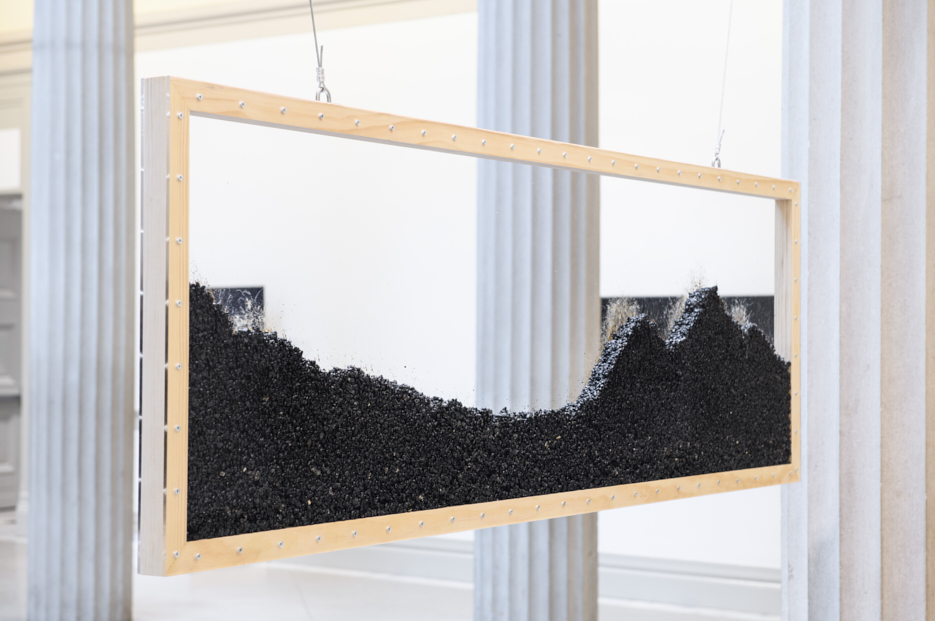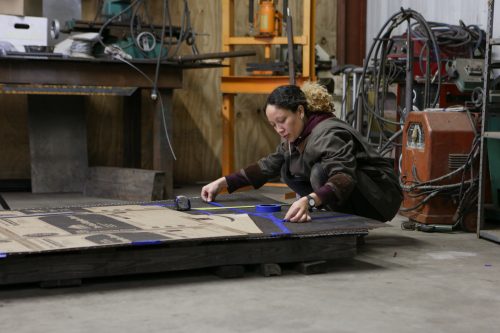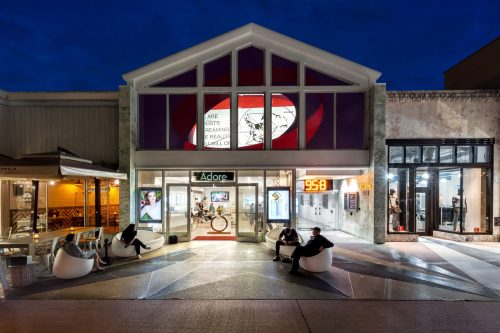Visual Art
How will Miami’s arts community survive? Groups answer call for help

“Man-Made Environment (here, there, everywhere)” is a work by Devora Perez, an artist featured through the Diaspora Vibe Cultural Arts Incubator. (Photo courtesy of DVCAI)
In these dark days of social distancing and shuttered arts venues, doors are opening to help visual artists survive the economic onslaught of COVID-19.
Art is increasingly coming online for the viewers, and critical financial resources are coming online for the artists. Such online resources connect artists and culture-lovers virtually, producing both material and emotional benefits. But will these be enough for all or most of Miami’s arts community to survive when no one knows how long the crisis will last?
“We all want to be optimistic, but there will be loss, there will be grief, and I think we need to find new ways to come together,” said Lorie Mertes, executive director of the Design District alternative space Locust Projects. “It’s almost like the austerity measures after World War II. It’s too early to know what the impact will be, but we are all thinking about it.”
Michael Spring, director of the Miami-Dade County Department of Cultural Affairs, regularly sends out emails with information for artists and nonprofit organizations during this crisis. (The Department of Cultural Affairs helps support the mission of ArtburstMiami.com.) Spring’s April 1 update discussed federal and local relief funding from sources such as the National Endowment for the Arts, the Knight Foundation, Oolite Arts, and the Miami Pandemic Response Fund started by United Way of Miami-Dade and the Miami Herald/el Nuevo Herald.
The new Oolite Arts relief fund – started March 26 with $25,000 repurposed from canceled programming – has more than quadrupled. It has received donations from individuals as well as from The Jorge M. Perez Foundation at The Miami Foundation and The Lynn and Louis Wolfson II Family Foundation. Oolite has since provided an additional $25,000.
“People really do understand how much of a driver our cultural sector has become, in driving tourism, our economy, and making Miami a place people want to live,” said Oolite Arts President and CEO Dennis Scholl in an email, commenting on the relief fund’s rapid-fire growth. “One of the more rewarding moments in establishing the fund is to see that a number of artists and cultural workers have also made contributions … noting that they were still employed and wanted to do what they could for their colleagues in the art world who were struggling.”

Artist GeoVanna Gonzalez prepares for an exhibition at Locust Projects that was later postponed. (Photo courtesy of Pulp Arts)
Visual artists who are Miami-Dade County residents can apply for up to $500 of lost income due to canceled employment, whether or not it’s in the cultural sector, or canceled professional artistic opportunities. Applications will be accepted through April 16.
Miami Beach-based Oolite Arts has already sent checks to about 250 artists, Scholl said.
Meanwhile, The Fountainhead Residency is providing Miami-based artists and supporters numerous online opportunities, including an updated “Artists’ Resources” webpage and the ability to sell work priced under $1,000 directly.
It also is hosting virtual studio visits via Fountainhead’s Instagram account. The format is informal and engaging.
“To see inside an artist’s studio is an absolute privilege. It is truly the artists that are getting us through this,” Fountainhead Director Kathryn Mikesell said. “This is going to help us understand the value artists bring to our lives.”
The initiative – which is open to Miami artists as well as Fountainhead Residency alumni artists – is expected to continue after the threat of COVID-19 is over, Mikesell said.
Artists David Rohn and Alex Nuñez are among those who’ve already conducted virtual studio visits courtesy of Fountainhead.
“Like a lot of things now, it all seems a second-rate version of ‘going live.’ But it’s what we’ve got right now, way better than nothing,” said Rohn via email about his virtual studio visit. “And for me personally, at least, it all wound up actually being more real than I expected.
“Seeing the icons of watchers and the occasional waves of ‘thumbs-up’ and ‘hearts’ made me feel that it was all happening in real time, and I found myself getting a lot more personal and open than I’d expected to.”
While there’s no virtual exhibit at Locust Projects, the alternative space is also posting artist resources and assisting in other ways.
“Virtual exhibits are tricky for Locust,” said its executive director, Mertes. “Locust is so much about process and site-specific experience.”
She said The Andy Warhol Foundation for the Visual Arts will collaborate with its 16 regional re-granting partners across the country, including Locust Projects in Miami, to distribute emergency grants to artists affected by the pandemic.

Oolite Arts, seen here from Lincoln Road, has started a relief fund to help artists. (Photo courtesy of Zach Balber)
With Warhol’s approval to re-allocate money from the 2021 WaveMaker Grants, Locust Projects can award a minimum of 40 Miami visual artists with $1,500 each in emergency relief funds. Details on how to apply will be announced by April 15 on Locust’s website and through social media. Grants will be awarded before June 1.
Additionally, Locust Projects has informed the 12 artists soon-to-be-announced as the 2020 WaveMaker recipients that they may use up to 50 percent of their grant toward emergency relief, if needed due to COVID-19.
Rosie Gordon Wallace is founder and chief curator of Diaspora Vibe Cultural Arts Incubator, which provides international opportunities for Miami and Caribbean artists. DVCAI has operated online for several years. However, this crisis is so new that Wallace has not yet secured major funding to assist her stable of about 45 artists. She hopes immigrant status will not exclude DVCAI from the funding process.
“I continue to reach out and ask, ‘How are you doing and what do you need?’” she said. “My concern is around the day-to-day — rent, food, gas, and the emotional stability of the artist.”
Miami-based art historian and curator Aldeide Delgado recalls that as COVID-19 began raging in Europe, her inbox started to fill up with cancellations. She and her partner, artist Francisco Maso, were scheduled to participate in a photography biennial in Italy that was canceled.
In response to all these vanished opportunities, the pair on March 12 set up a public Facebook page for sharing resources and news, titled “COVID-19 Cultural Affairs Alliance.” It now has more than 700 members.
“Our priority is our health and safety, but we also need to take care of our community,” Delgado said. “We decided to make this a space of solidarity and to think together.”
ArtburstMiami.com is a nonprofit source of theater, dance, visual arts, music and performing arts news. Sign up for our newsletter and never miss a story.
